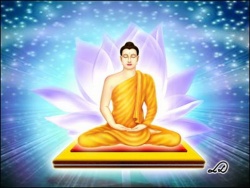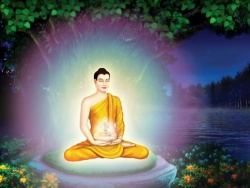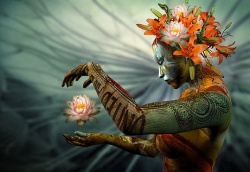Difference between revisions of "The Sun Sutra"
(Created page with "thumb|250px| <poem> In the Indian Language [Sanskrit]: Surya Sutra In the Tibetan Language: Nyima’i Do (nyi ma’i mdo) In the English Language: The Sun...") |
|||
| Line 1: | Line 1: | ||
[[File:00-4.jpg|thumb|250px|]] | [[File:00-4.jpg|thumb|250px|]] | ||
<poem> | <poem> | ||
| − | In the Indian Language [Sanskrit]: Surya Sutra | + | In the Indian [[Language]] [Sanskrit]: Surya [[Sutra]] |
| − | In the Tibetan Language: Nyima’i Do (nyi ma’i mdo) | + | In the Tibetan [[Language]]: Nyima’i Do (nyi ma’i mdo) |
| − | In the English Language: The Sun Sutra | + | In the English [[Language]]: The Sun [[Sutra]] |
| − | PROSTRATIONS OF DEVOTION TO THE EXALTED | + | PROSTRATIONS OF DEVOTION TO THE EXALTED [[Three Jewels]]! |
| − | Thus have I heard: at one time, the Transcendent and Accomplished Conqueror was near Shravasti, in the benefactor Anathapindada’s relaxation garden in Jetavana Grove. At that time, the divine boy Surya [the Sun] was captured by a king of the demi-gods, Rahula. | + | Thus have I heard: at one time, the Transcendent and Accomplished Conqueror was near Shravasti, in the benefactor Anathapindada’s relaxation garden in [[Jetavana]] Grove. At that time, the divine boy Surya [the Sun] was captured by a king of the demi-gods, Rahula. |
Thereupon, the divine boy Surya contemplated the recollection of the Transcendent Conqueror. At that time, he spoke the following verses: | Thereupon, the divine boy Surya contemplated the recollection of the Transcendent Conqueror. At that time, he spoke the following verses: | ||
| − | I bow to | + | I bow to [[The Buddha]], the Hero, |
Please free us all quickly. | Please free us all quickly. | ||
| Line 21: | Line 21: | ||
As I call out to you from this mouth of mine, | As I call out to you from this mouth of mine, | ||
| − | I go for | + | I go for [[Refuge]] in you! |
| − | Then, the Transcendent Conqueror, for the sake of the young | + | Then, the Transcendent Conqueror, for the sake of the young [[God]] Surya, bestowed the following sacred words of verse to the king of the demi-gods, Rahula: |
| − | “As | + | “As [[The Buddha]] has [[Love]] for the [[World]], |
| − | Since Surya has gone for | + | Since Surya has gone for [[Refuge]] |
[[File:02-Enlig.jpg|thumb|250px|]] | [[File:02-Enlig.jpg|thumb|250px|]] | ||
| − | In the Arhat Tathagata, | + | In the [[Arhat]] [[Tathagata]], |
Then Rahula[i] will see the Sun. | Then Rahula[i] will see the Sun. | ||
| Line 41: | Line 41: | ||
As for this Sun, Rahula, behold it! | As for this Sun, Rahula, behold it! | ||
| − | Thereupon, the king of the demi-gods Rahula released the young | + | Thereupon, the king of the demi-gods Rahula released the young [[God]] Surya, and returning to his previous [[Form]], he went before the king of the demi-gods Splendid Threads. Having gone there, as his [[Mind]] was unhappy and saddened, his hairs stood on end, and he stayed to one side. As he stood to one side, the king of the demi-gods Splendid Threads spoke the following verses to the king of the demi-gods Rahula: |
| − | Why is it that your | + | Why is it that your [[Mind]] has become upset? |
Rahula has seen the Sun. | Rahula has seen the Sun. | ||
| − | The appearance of your | + | The appearance of your [[Body]] is absolutely bad. |
Why is it that, out of fear, you have come here? | Why is it that, out of fear, you have come here? | ||
| Line 53: | Line 53: | ||
Rahula spoke thus: | Rahula spoke thus: | ||
[[File:Work 2.jpg|thumb|250px|]] | [[File:Work 2.jpg|thumb|250px|]] | ||
| − | Because I heard the verses of | + | Because I heard the verses of [[The Buddha]], |
I was not able to steal Surya, | I was not able to steal Surya, | ||
| Line 59: | Line 59: | ||
And so my head split into seven pieces: | And so my head split into seven pieces: | ||
| − | In my | + | In my [[Life]], I have no [[Happiness]]. |
| − | THE SUN | + | THE SUN [[Sutra]] IS COMPLETE. |
| − | In the presence of the Mahapandita Anandashri, the translator of much learning, the Shakyan | + | In the presence of the Mahapandita Anandashri, the translator of much learning, the Shakyan [[Monk]] Nyima Gyaltshen Pel Zangpo (Excellent Glorious Victory Banner of the Sun) translated, copied, and confirmed this at the dwelling place of the bi-lingual ones, the great temple Pel Tharpa Ling. On this earth, may it become like the sun and the moon! |
Translated by Erick Tsiknopoulos. | Translated by Erick Tsiknopoulos. | ||
| − | [i]Rahula (Sanskrit for “hindrance”) is an ancient Indian astronomical conception, a demon, a tantric meditational deity, the | + | [i]Rahula ([[Sanskrit]] for “hindrance”) is an ancient Indian astronomical conception, a demon, a tantric meditational deity, the [[Phenomena]] of eclipses (and also the name of [[The Buddha]]’s son). Rahula is generally associated with destructive or wrathful astro-geological activities and [[Phenomena]] and their related correlates. Rahula trying to steal the sun in this [[Sutra]] is probably a metaphor for an eclipse. The Sun takes [[Refuge]] in [[The Buddha]] and thus reveals his true [[Power]], dispelling the malevolent ecliptic celestial force of Rahula. Since eclipses are seen as unfavorable in many Buddhist cultures including Tibetan, it’s possible that this [[Sutra]] was and is recited during times of eclipse in Tibet and elsewhere. |
</poem> | </poem> | ||
{{R}} | {{R}} | ||
Revision as of 05:15, 9 April 2013
In the Indian Language [Sanskrit]: Surya Sutra
In the Tibetan Language: Nyima’i Do (nyi ma’i mdo)
In the English Language: The Sun Sutra
PROSTRATIONS OF DEVOTION TO THE EXALTED Three Jewels!
Thus have I heard: at one time, the Transcendent and Accomplished Conqueror was near Shravasti, in the benefactor Anathapindada’s relaxation garden in Jetavana Grove. At that time, the divine boy Surya [the Sun] was captured by a king of the demi-gods, Rahula.
Thereupon, the divine boy Surya contemplated the recollection of the Transcendent Conqueror. At that time, he spoke the following verses:
I bow to The Buddha, the Hero,
Please free us all quickly.
As I call out to you from this mouth of mine,
I go for Refuge in you!
Then, the Transcendent Conqueror, for the sake of the young God Surya, bestowed the following sacred words of verse to the king of the demi-gods, Rahula:
“As The Buddha has Love for the World,
Since Surya has gone for Refuge
In the Arhat Tathagata,
Then Rahula[i] will see the Sun.
Whatever darkness there is, through illumination it will be dispelled.
The charismatic radiance of fierce Vairochana, the disk-like moon,
And the sun in the sky: Rahula cannot obscure them.
As for this Sun, Rahula, behold it!
Thereupon, the king of the demi-gods Rahula released the young God Surya, and returning to his previous Form, he went before the king of the demi-gods Splendid Threads. Having gone there, as his Mind was unhappy and saddened, his hairs stood on end, and he stayed to one side. As he stood to one side, the king of the demi-gods Splendid Threads spoke the following verses to the king of the demi-gods Rahula:
Why is it that your Mind has become upset?
Rahula has seen the Sun.
The appearance of your Body is absolutely bad.
Why is it that, out of fear, you have come here?
Rahula spoke thus:
Because I heard the verses of The Buddha,
I was not able to steal Surya,
And so my head split into seven pieces:
In my Life, I have no Happiness.
THE SUN Sutra IS COMPLETE.
In the presence of the Mahapandita Anandashri, the translator of much learning, the Shakyan Monk Nyima Gyaltshen Pel Zangpo (Excellent Glorious Victory Banner of the Sun) translated, copied, and confirmed this at the dwelling place of the bi-lingual ones, the great temple Pel Tharpa Ling. On this earth, may it become like the sun and the moon!
Translated by Erick Tsiknopoulos.
[i]Rahula (Sanskrit for “hindrance”) is an ancient Indian astronomical conception, a demon, a tantric meditational deity, the Phenomena of eclipses (and also the name of The Buddha’s son). Rahula is generally associated with destructive or wrathful astro-geological activities and Phenomena and their related correlates. Rahula trying to steal the sun in this Sutra is probably a metaphor for an eclipse. The Sun takes Refuge in The Buddha and thus reveals his true Power, dispelling the malevolent ecliptic celestial force of Rahula. Since eclipses are seen as unfavorable in many Buddhist cultures including Tibetan, it’s possible that this Sutra was and is recited during times of eclipse in Tibet and elsewhere.


